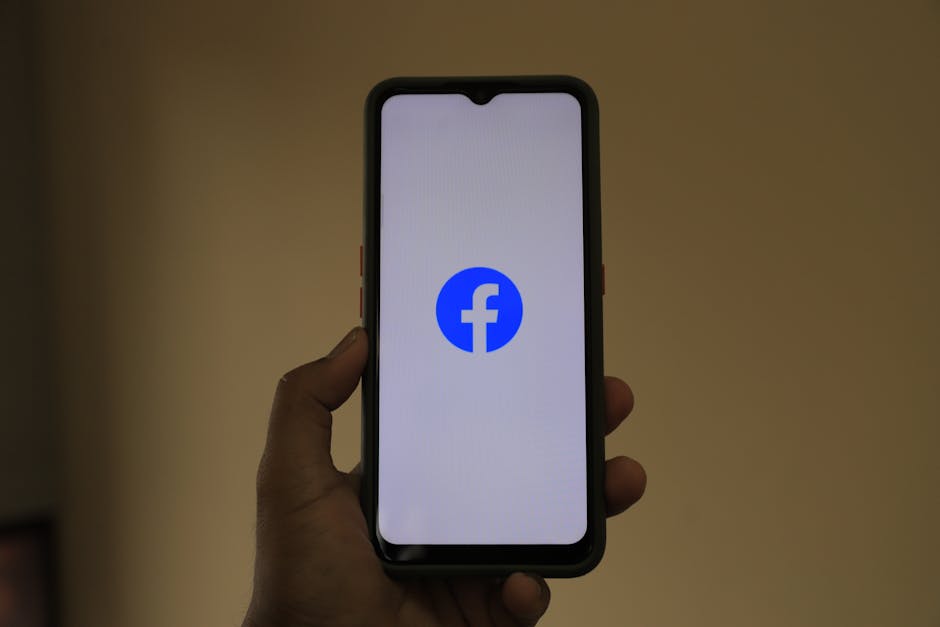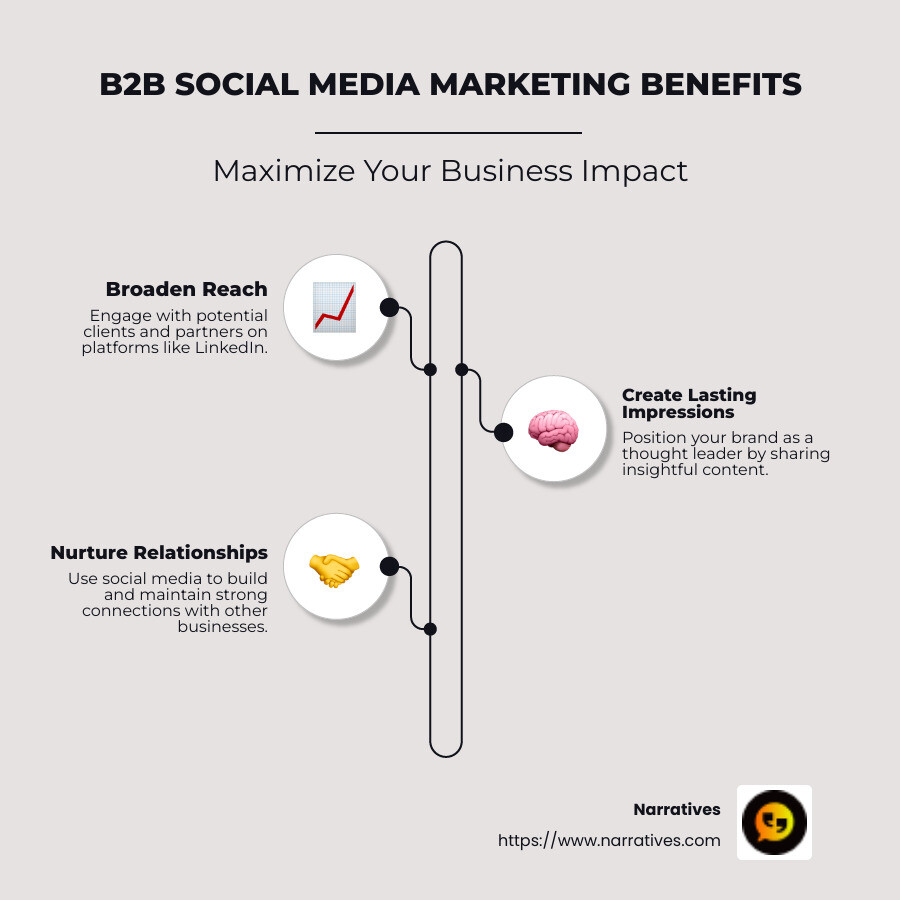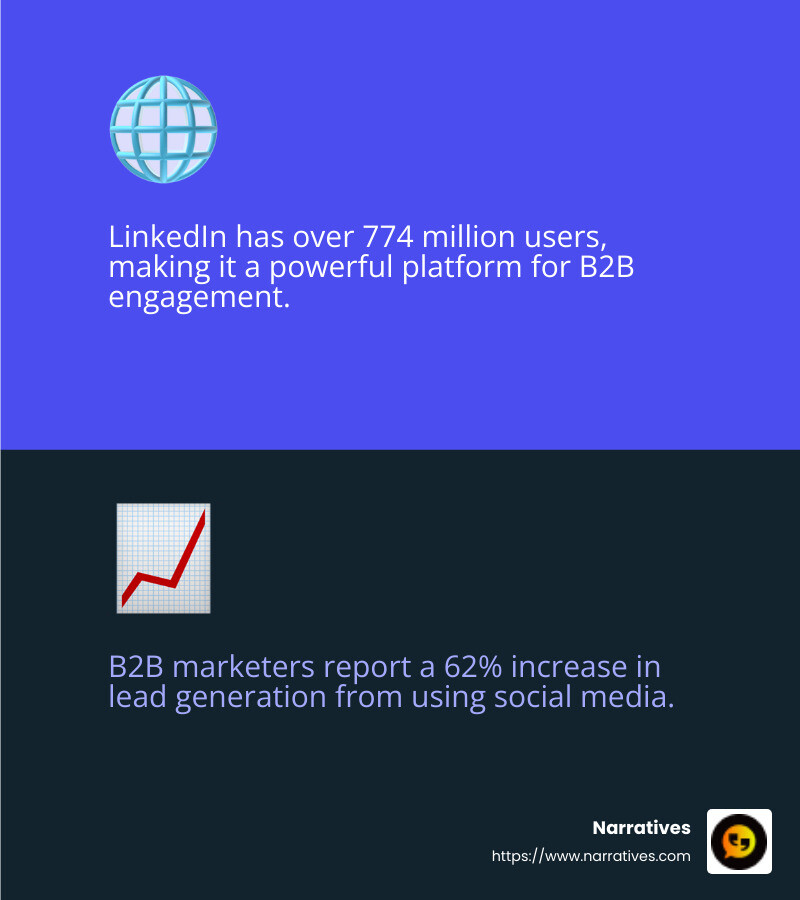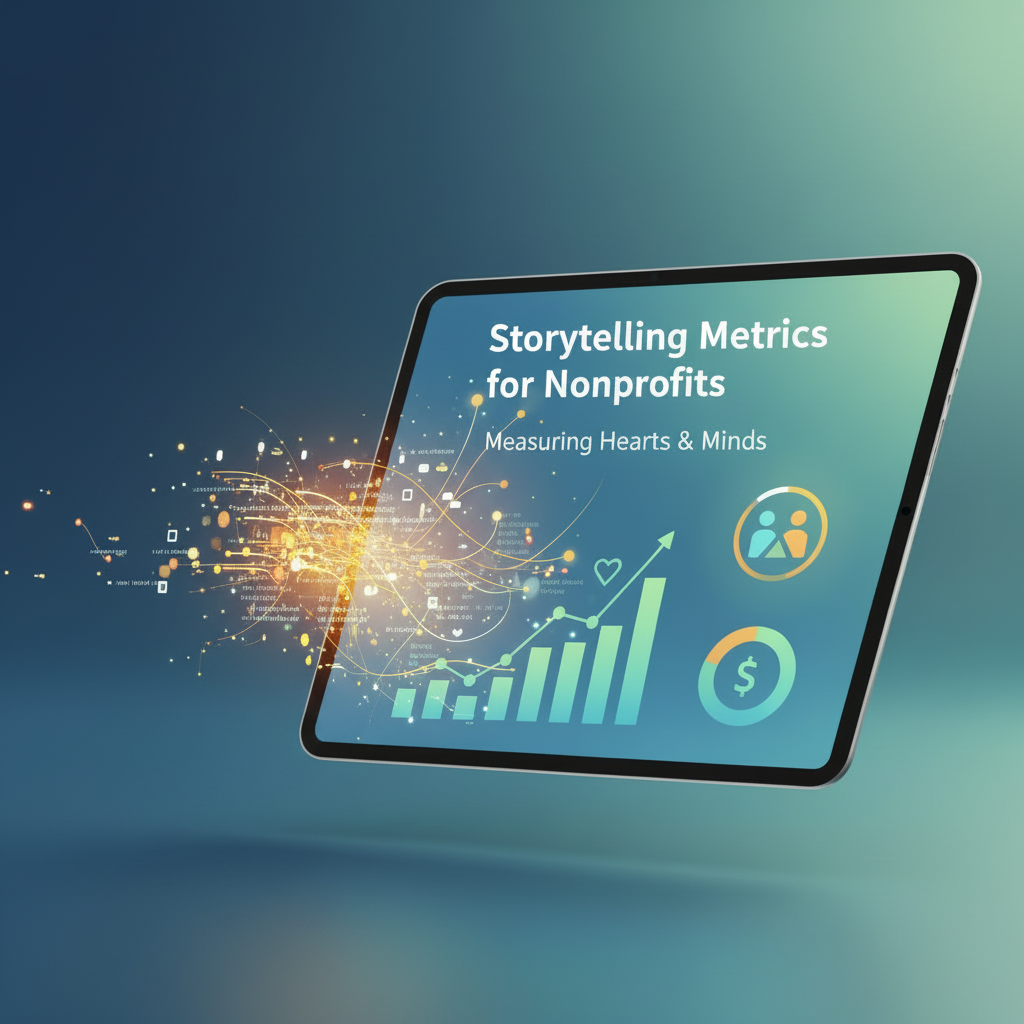Mastering B2B Social Media: A How-To Guide

Social media marketing for B2B companies has become an essential tool for building brand awareness and reaching key decision-makers.
- Broaden Your Reach: Engage with potential clients and partners on platforms like LinkedIn.
- Create Lasting Impressions: Position your brand as a thought leader by sharing insightful content.
- Nurture Relationships: Use social media to build and maintain strong connections with other businesses.
Social media offers a dynamic way to showcase your expertise, foster relationships, and establish credibility in your industry. While many still associate social media primarily with B2C interactions, the B2B landscape is embracing these platforms to create meaningful connections and influence purchasing decisions. As one expert noted, "Social media marketing can offer B2B marketers a range of benefits if they take advantage of it, from increasing engagement and influencing decision making before the sales call to customizing sales messages and enhancing their company’s reputation."
Today, B2B companies are leveraging social media not just to broadcast their services but to engage, enlighten, and empower their target audience. Whether you're a small startup or a large corporation, understanding the power of social media in your B2B strategy can put you steps ahead of the competition.

Common social media marketing for b2b companies vocab:
- social media marketing agency services
- social media management strategy
- social media advertising management
Understanding B2B Social Media Marketing
Social media marketing for B2B companies is more than just a trend—it's a powerful tool for expanding brand reach and enhancing customer engagement. Unlike B2C marketing, which often focuses on direct sales to consumers, B2B social media efforts aim to build long-lasting relationships with other businesses. This involves creating valuable content, fostering discussions, and positioning your brand as a thought leader in your industry.
Expanding Brand Reach
Social media platforms offer B2B companies an extensive audience to tap into. With billions of users globally, platforms like LinkedIn and Facebook provide opportunities to connect with potential clients and partners. A strong social media presence not only increases brand visibility but also helps establish your company as an industry leader.
- LinkedIn: The go-to platform for B2B interactions. It's where decision-makers and professionals connect, making it ideal for showcasing expertise and networking.
- Facebook: While traditionally seen as a B2C platform, Facebook still offers valuable opportunities for B2B companies to engage with a broader audience through groups and targeted ads.

Enhancing Customer Engagement
Engagement is key to successful social media marketing for B2B companies. Social media platforms allow businesses to interact with their audience in real-time, addressing queries and concerns promptly. This not only improves customer service but also builds trust and loyalty.
- Real-Time Interaction: Responding to comments and messages quickly can turn a casual observer into a loyal client.
- Building Relationships: Consistent engagement helps nurture relationships with clients, making them more likely to choose your services over competitors.
Leveraging Thought Leadership
B2B companies can use social media to share insights and trends, positioning themselves as thought leaders. This not only attracts potential clients but also keeps your brand top-of-mind when businesses are ready to make purchasing decisions. Sharing expert opinions and industry news can significantly improve your brand's credibility.
- Insightful Content: Share articles, whitepapers, and case studies that address industry challenges and provide solutions.
- Industry Trends: Keep your audience informed about the latest developments in your field, establishing your brand as a go-to resource.
In the evolving landscape of B2B marketing, understanding and utilizing social media effectively can give your company a competitive edge. By expanding your brand reach, enhancing customer engagement, and leveraging thought leadership, social media becomes a crucial component of your marketing strategy. Let's explore how to build a robust B2B social media strategy.
Building a B2B Social Media Strategy
Creating a strong social media strategy for B2B companies starts with clear goals, knowing your audience, and planning engaging content. Let's break it down.
Goal Setting
Before diving into social media, set SMART goals: Specific, Measurable, Achievable, Relevant, and Time-bound. These goals guide your strategy and help track success.
For example, you might aim to increase your LinkedIn followers by 20% in six months. This goal is specific (LinkedIn followers), measurable (20% increase), achievable (with targeted content), relevant (boosts brand visibility), and time-bound (six months).
Knowing Your Target Audience
Understanding who you're talking to is crucial. Identify the industries you serve and the decision-makers you want to reach. This knowledge helps tailor your content to resonate with them.
Research Competitors: Check out what your competitors are doing on social media. See which of their posts get the most engagement. Use this as inspiration, not to copy, but to understand what might work for your audience.
Engage Directly: Use tools like LinkedIn polls to gather insights directly from your audience. Ask about their challenges and needs to inform your content strategy.
Content Planning
Content is king, but planning is its queen. A well-thought-out content calendar ensures consistency and relevance in your posts.
90-Day Content Calendar: Start with a 90-day plan. This doesn't mean posting daily but having a structured approach. Consistent posting keeps your brand visible and engaging.
Leverage Existing Content: Use existing resources like blog posts, whitepapers, and videos. Repurpose them for social media to maintain a steady flow of content.
Budget for Promotion: Consider allocating a budget for targeted ad campaigns. These can introduce your brand to new audiences and boost your follower count. Partnering with influencers or using ads can be effective strategies.
Legal Clearance: Always check with your legal team before posting, especially when using trends or memes. This avoids potential legal issues and keeps your content safe and compliant.
Building a successful social media strategy for B2B companies involves setting clear goals, understanding your audience, and planning content carefully. With these steps, you can create a strategy that not only increases brand awareness but also fosters deeper connections with potential clients.
Let's now explore which social media platforms are most effective for B2B marketing.
Top Social Media Platforms for B2B Companies
Choosing the right social media platforms is crucial for effective social media marketing for B2B companies. Each platform offers unique advantages and can help you reach different segments of your target audience. Let's explore the top platforms for B2B marketing.
LinkedIn is the go-to platform for B2B marketers. With its professional focus, it's ideal for reaching decision-makers and industry leaders. According to a study by Wpromote, 84% of B2B marketers find LinkedIn to be the most valuable for organic social media engagement.
Why LinkedIn?
- Professional Networking: It connects you directly with professionals and businesses.
- Content Sharing: Share thought leadership content like articles, industry insights, and infographics to establish authority.
- Targeted Advertising: Use LinkedIn's robust targeting options to reach specific industries and job roles.
While often seen as a B2C platform, Facebook has made significant strides in the B2B space. Its vast user base and advanced targeting options make it a valuable tool for B2B companies.
Why Facebook?
- Wide Reach: With billions of users, it offers unparalleled reach.
- Community Building: Create groups to foster community and engage with your audience on a deeper level.
- Content Diversity: Share a mix of content types, including videos, articles, and live streams, to keep your audience engaged.
YouTube
YouTube is a powerful platform for B2B marketers looking to leverage video content. It helps in demonstrating product features and sharing customer testimonials.
Why YouTube?
- Visual Storytelling: Videos are a compelling way to tell your brand's story and explain complex products.
- SEO Benefits: YouTube videos can improve your search visibility, driving more traffic to your site.
- Educational Content: Use tutorials and how-to videos to educate your audience and establish your brand as an industry expert.
TikTok
Though relatively new to the B2B scene, TikTok offers unique opportunities for brands to showcase their creative side. It's especially effective for reaching younger audiences.
Why TikTok?
- Engagement: TikTok's short-form videos are highly engaging and can go viral quickly.
- Brand Personality: Showcase your brand's personality through fun and creative content.
- Trend Participation: Engage with current trends to increase visibility and connect with a broader audience.
Choosing the right platform depends on where your target audience spends their time. Each platform has its strengths, so consider your goals and audience when deciding where to focus your efforts. Next, let's explore the types of content that work best for B2B marketing.
Effective Content Types for B2B Marketing
When it comes to social media marketing for B2B companies, choosing the right content type is as important as selecting the right platform. Let's explore some of the most effective content types for B2B marketing: video content, thought leadership, and user-generated content.
Video Content
Video content is a game-changer for B2B marketing. It's not just about visuals; it's about telling a story that resonates. Why is video so effective?
High Engagement: Videos capture attention quickly and keep viewers engaged. A Salesforce case study showed that lo-fi vertical videos on LinkedIn received 2-3 times more engagements than traditional formats.
Clear Communication: Use short video demos to showcase product features. Keep them under 30 seconds to maintain interest and focus on solving customer pain points.
SEO Boost: Videos can improve your search engine rankings. Hosting them on platforms like YouTube can drive traffic to your website.
Thought Leadership
Thought leadership content establishes your company as an expert in your field. It's about providing value and insights that help your audience make informed decisions.
Practical Advice: According to the LinkedIn-Edelman B2B Thought Leadership Impact Report, the best content offers practical solutions to common business problems.
Data-Driven Insights: Use industry reports and trend analyses to back your claims. This positions your company as a credible source of information.
Success Stories: Share success stories and case studies that highlight how your product or service has benefited other businesses.
User-Generated Content (UGC)
User-generated content is all about authenticity. It involves leveraging content created by your customers, which can improve your brand's credibility.
Trust and Credibility: UGC often carries more weight than brand-generated content. When potential customers see real people vouching for your products, they're more likely to trust your brand.
Cost-Effective: Instead of investing heavily in content creation, tap into the creativity of your existing customers.
Engagement: UGC encourages interaction. People love seeing their content featured by brands they trust, which boosts engagement rates.

Each content type serves a unique purpose and can be custom to fit your marketing goals. Whether it's engaging videos, insightful thought leadership, or authentic user-generated content, the key is to provide value and connect with your audience on a deeper level.
Next, let's explore how AI can transform your B2B social media strategy.
Leveraging AI in B2B Social Media
AI is revolutionizing social media marketing for B2B companies by streamlining processes and enhancing engagement. Here’s how AI can make a difference:
Generating Content Ideas
Even the most creative minds hit roadblocks. AI tools like ChatGPT can help break through writer’s block by generating fresh content ideas. With just a well-crafted prompt, AI can provide a rough draft for your social media posts. This gives you a solid starting point to personalize and refine the content for your audience.
Remember: While AI can spark ideas, the final touch should always come from a human to maintain authenticity.
Chatbots for Customer Interaction
Chatbots are game-changers for managing customer interactions. They can handle basic inquiries on your social media channels 24/7, ensuring your audience always gets timely responses.
Efficiency: Chatbots can answer frequently asked questions and route complex queries to your sales team. This ensures that no lead is lost due to delayed responses.
Consistency: They provide consistent and accurate information, enhancing customer trust in your brand.
Scheduling Posts
Timing is crucial in social media marketing. AI can analyze your engagement history to determine the best times to post. This ensures your content reaches your audience when they are most active.
Optimal Timing: AI tools can identify peak engagement periods, ensuring your posts get maximum visibility and interaction.
Automation: Schedule your posts in advance, freeing up time for you to focus on strategy and creativity.
By integrating AI into your B2B social media strategy, you can improve efficiency, improve engagement, and ensure your content resonates with your audience. AI is not just a tool; it’s a partner in crafting a dynamic and effective marketing approach.
Next, let’s dive into some frequently asked questions about social media marketing for B2B companies.
Frequently Asked Questions about Social Media Marketing for B2B Companies
How can B2B companies generate leads through social media?
Generating leads through social media is all about reaching the right people and engaging them with relevant content. Here’s how B2B companies can make it happen:
Targeted Content: Use advanced targeting features on platforms like LinkedIn to reach decision-makers. Share content that addresses their specific pain points and needs.
Engagement: Encourage interaction by posting polls, asking questions, and responding to comments. The more engagement your posts receive, the more likely they are to reach a wider audience.
Lead Magnets: Offer valuable resources like whitepapers or webinars in exchange for contact information. This not only provides value but also helps you gather qualified leads.
Consistency: Regular posting keeps your brand top-of-mind. Consistent engagement can lead to long-term relationships and eventually, conversions.
What types of content work best for B2B social media?
In social media marketing for B2B companies, the type of content you share can make or break your strategy. Here are some effective types:
Video Content: Short, engaging videos can showcase your product's features and benefits. Lo-fi vertical videos, in particular, have proven successful on platforms like LinkedIn.
Thought Leadership: Share insights and industry trends to position your brand as an authority. LinkedIn newsletters can be a great way to disseminate this content.
User-Generated Content: Encourage your customers to share their experiences with your product. This not only builds community but also provides authentic content that resonates with potential clients.
Memes and Polls: These can make your brand feel more relatable and increase engagement. Just ensure they align with your brand’s messaging.
How can AI improve B2B social media strategies?
AI tools are changing how B2B companies approach social media. Here’s how they can improve your strategy:
Content Optimization: AI can analyze past performance to suggest the best types of content for your audience. This ensures your posts are both relevant and engaging.
AI Tools for Insights: Platforms like Marketing Cloud Account Engagement can provide insights into customer behavior, helping you tailor your content to meet their needs.
Automated Scheduling: AI can determine the optimal times to post, maximizing visibility and engagement. This allows you to focus on creating high-quality content while AI handles the logistics.
Chatbots: These AI-powered tools can manage customer interactions around the clock, providing instant responses and freeing up your team to focus on more complex tasks.
By leveraging AI, B2B companies can streamline their social media efforts, ensuring their content not only reaches but resonates with their target audience. This integration of technology and strategy is key to staying competitive in the changing digital landscape.
Conclusion
In the evolving landscape of social media marketing for B2B companies, storytelling stands out as a powerful tool. At Narratives, we believe in the transformative power of storytelling, especially for non-profits and purpose-driven organizations. Our mission is to amplify underrepresented voices through compelling multimedia content that resonates on a human level.
Partnerships with Non-Profits: Collaborating with non-profits allows us to craft stories that inspire action and build trust. By highlighting the real-life impact of these organizations, we not only lift their missions but also foster community engagement. Our approach ensures that each story is not just heard but felt, creating a lasting impression that encourages support and involvement.
The Role of Storytelling: Storytelling is not just about sharing information; it's about creating an emotional connection. By weaving narratives that showcase the challenges and triumphs of the communities we serve, we help organizations connect with their audience on a deeper level. This connection is crucial for building long-term relationships and sustaining support.
Why Choose Narratives: As your digital storytelling partner, we offer expertise in creating high-quality, emotionally resonant content. Our focus on non-profit partnerships and social impact storytelling ensures that your message reaches and resonates with the right audience. By choosing Narratives, you're not just amplifying your voice; you're joining a community dedicated to making a difference.
Explore how we can help your organization tell its story and inspire change. Learn more about our media services.
Tell your story with us, and together, let's create a narrative that drives impact and inspires action.


